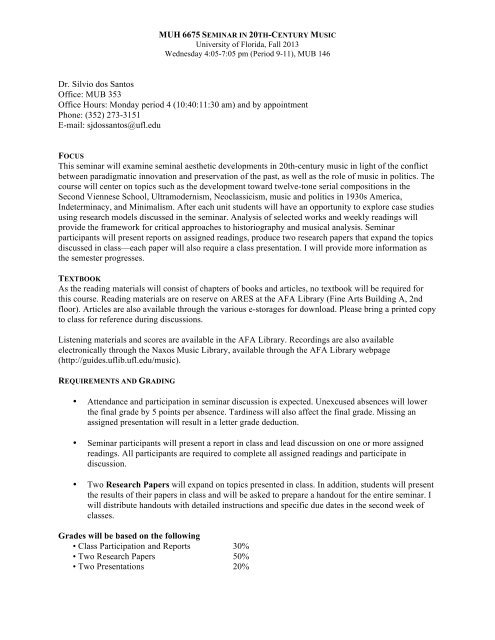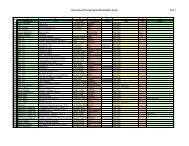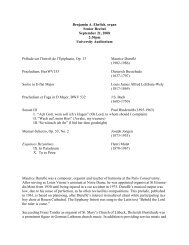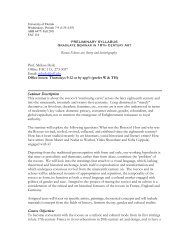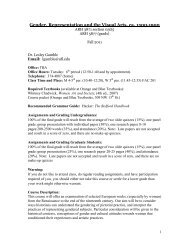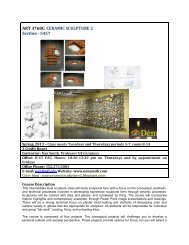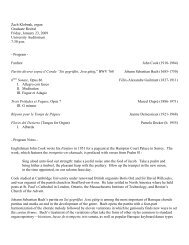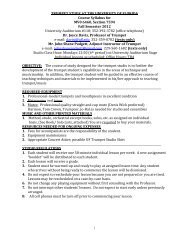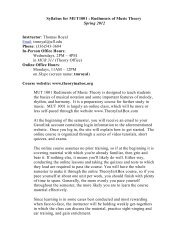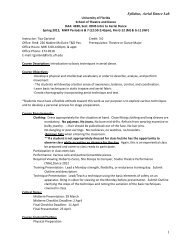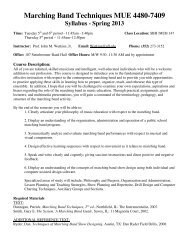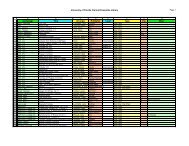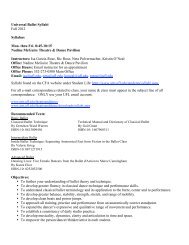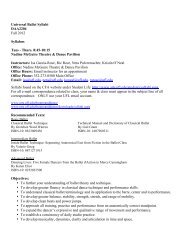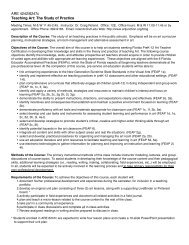MUH6675 Seminar in 20th-Century Music - College of Fine Arts
MUH6675 Seminar in 20th-Century Music - College of Fine Arts
MUH6675 Seminar in 20th-Century Music - College of Fine Arts
Create successful ePaper yourself
Turn your PDF publications into a flip-book with our unique Google optimized e-Paper software.
MUH 6675 SEMINAR IN 20TH-CENTURY MUSIC<br />
University <strong>of</strong> Florida, Fall 2013<br />
Wednesday 4:05-7:05 pm (Period 9-11), MUB 146<br />
Dr. Silvio dos Santos<br />
Office: MUB 353<br />
Office Hours: Monday period 4 (10:40:11:30 am) and by appo<strong>in</strong>tment<br />
Phone: (352) 273-3151<br />
E-mail: sjdossantos@ufl.edu<br />
FOCUS<br />
This sem<strong>in</strong>ar will exam<strong>in</strong>e sem<strong>in</strong>al aesthetic developments <strong>in</strong> <strong>20th</strong>-century music <strong>in</strong> light <strong>of</strong> the conflict<br />
between paradigmatic <strong>in</strong>novation and preservation <strong>of</strong> the past, as well as the role <strong>of</strong> music <strong>in</strong> politics. The<br />
course will center on topics such as the development toward twelve-tone serial compositions <strong>in</strong> the<br />
Second Viennese School, Ultramodernism, Neoclassicism, music and politics <strong>in</strong> 1930s America,<br />
Indeterm<strong>in</strong>acy, and M<strong>in</strong>imalism. After each unit students will have an opportunity to explore case studies<br />
us<strong>in</strong>g research models discussed <strong>in</strong> the sem<strong>in</strong>ar. Analysis <strong>of</strong> selected works and weekly read<strong>in</strong>gs will<br />
provide the framework for critical approaches to historiography and musical analysis. <strong>Sem<strong>in</strong>ar</strong><br />
participants will present reports on assigned read<strong>in</strong>gs, produce two research papers that expand the topics<br />
discussed <strong>in</strong> class—each paper will also require a class presentation. I will provide more <strong>in</strong>formation as<br />
the semester progresses.<br />
TEXTBOOK<br />
As the read<strong>in</strong>g materials will consist <strong>of</strong> chapters <strong>of</strong> books and articles, no textbook will be required for<br />
this course. Read<strong>in</strong>g materials are on reserve on ARES at the AFA Library (F<strong>in</strong>e <strong>Arts</strong> Build<strong>in</strong>g A, 2nd<br />
floor). Articles are also available through the various e-storages for download. Please br<strong>in</strong>g a pr<strong>in</strong>ted copy<br />
to class for reference dur<strong>in</strong>g discussions.<br />
Listen<strong>in</strong>g materials and scores are available <strong>in</strong> the AFA Library. Record<strong>in</strong>gs are also available<br />
electronically through the Naxos <strong>Music</strong> Library, available through the AFA Library webpage<br />
(http://guides.uflib.ufl.edu/music).<br />
REQUIREMENTS AND GRADING<br />
• Attendance and participation <strong>in</strong> sem<strong>in</strong>ar discussion is expected. Unexcused absences will lower<br />
the f<strong>in</strong>al grade by 5 po<strong>in</strong>ts per absence. Tard<strong>in</strong>ess will also affect the f<strong>in</strong>al grade. Miss<strong>in</strong>g an<br />
assigned presentation will result <strong>in</strong> a letter grade deduction.<br />
• <strong>Sem<strong>in</strong>ar</strong> participants will present a report <strong>in</strong> class and lead discussion on one or more assigned<br />
read<strong>in</strong>gs. All participants are required to complete all assigned read<strong>in</strong>gs and participate <strong>in</strong><br />
discussion.<br />
• Two Research Papers will expand on topics presented <strong>in</strong> class. In addition, students will present<br />
the results <strong>of</strong> their papers <strong>in</strong> class and will be asked to prepare a handout for the entire sem<strong>in</strong>ar. I<br />
will distribute handouts with detailed <strong>in</strong>structions and specific due dates <strong>in</strong> the second week <strong>of</strong><br />
classes.<br />
Grades will be based on the follow<strong>in</strong>g<br />
• Class Participation and Reports 30%<br />
• Two Research Papers 50%<br />
• Two Presentations 20%
dos Santos, <strong>MUH6675</strong> UF F13 p. 2<br />
Grad<strong>in</strong>g scale<br />
A: 94-100<br />
A-: 91-93<br />
B+: 88-90<br />
B: 84-87<br />
B-: 81-83<br />
C+: 78-80<br />
C: 74-77<br />
C-: 71-73<br />
D+: 68-70<br />
D: 64-67<br />
D-: 61-63<br />
E: 0-60<br />
* Please keep <strong>in</strong> m<strong>in</strong>d that C- is not a pass<strong>in</strong>g grade. Information on the conversion <strong>of</strong> grades to the<br />
University <strong>of</strong> Florida’s grade po<strong>in</strong>t averages can be found at .<br />
IMPORTANT DATES<br />
• Essays will be due a week after the class presentation. I will assign specific dates to each sem<strong>in</strong>ar<br />
participant on our second class.<br />
ADDITIONAL INFORMATION<br />
1. Classes will beg<strong>in</strong> promptly. Any student miss<strong>in</strong>g a class for any reason is responsible for gett<strong>in</strong>g notes<br />
and handouts from a fellow student, not the <strong>in</strong>structor. Turn <strong>of</strong>f computers and cell phones. A pop quiz<br />
will be given every time a phone r<strong>in</strong>gs <strong>in</strong> class. Please do not eat <strong>in</strong> class or engage <strong>in</strong> other distract<strong>in</strong>g<br />
activities.<br />
2. E-Learn<strong>in</strong>g: students will be required to add this class <strong>in</strong> the E-Learn<strong>in</strong>g system <strong>in</strong> order to submit the<br />
writ<strong>in</strong>g assignments onl<strong>in</strong>e.<br />
3. I will distribute handouts for the writ<strong>in</strong>g assignments as classes progress. Assignments are due at<br />
the beg<strong>in</strong>n<strong>in</strong>g <strong>of</strong> class on the day they are due. A penalty <strong>of</strong> 10% per day (maximum <strong>of</strong> two days)<br />
shall apply to essays turned <strong>in</strong> late. Thereafter, no credit will be given. All written work must also be<br />
submitted electronically through the E-Learn<strong>in</strong>g system to be graded. I will provide <strong>in</strong>structions on<br />
the handouts.<br />
4. Opportunity for mak<strong>in</strong>g up a presentation will be given only <strong>in</strong> cases <strong>of</strong> excused absences. An excused<br />
absence is def<strong>in</strong>ed as 1) a medical issue accompanied by a signed statement from your doctor, 2) a serious<br />
family emergency with a signed statement from parent or guardian, 3) an <strong>of</strong>ficial University <strong>of</strong> Florida<br />
activity accompanied by a signed statement from an appropriate faculty representative with a two-week<br />
prior notification to <strong>in</strong>structor, 4) a religious holiday observance with a two-week prior notification to<br />
<strong>in</strong>structor, 5) military service or court-imposed legal obligations accompanied by written pro<strong>of</strong> two weeks<br />
prior to absence. Failure to appear for an exam without prior arrangement will result <strong>in</strong> an E for that<br />
assignment.<br />
Classroom Policies<br />
Classes will beg<strong>in</strong> promptly. Students need to arrive on time, turn <strong>in</strong> assignments before sitt<strong>in</strong>g down, and<br />
stay for the entire class. In the rare case that you are unavoidably late, please enter quietly and take the<br />
first available seat. The period ends when the <strong>in</strong>structor dismisses the class. Preparations to leave (such as<br />
clos<strong>in</strong>g notebooks, rustl<strong>in</strong>g papers, and putt<strong>in</strong>g on your coat) before you are dismissed are disruptive;<br />
please avoid them. Do not exit before you are dismissed unless you have already advised the <strong>in</strong>structor<br />
that you must leave early (please do this before the period beg<strong>in</strong>s).<br />
Cell Phones and Electronics<br />
Turn <strong>of</strong>f computers and cell phones. A pop quiz will be given every time a phone r<strong>in</strong>gs <strong>in</strong> class. Internet<br />
connectivity must be disabled if you plan on tak<strong>in</strong>g notes directly on your laptop. Please do not eat <strong>in</strong><br />
class or engage <strong>in</strong> other distract<strong>in</strong>g activities.
dos Santos, <strong>MUH6675</strong> UF F13 p. 3<br />
Students with Disabilities<br />
To request classroom accommodations, contact the Assistant Dean <strong>of</strong> Students/Director <strong>of</strong> the Disability<br />
Resources Program at P202 Peabody Hall or call 392-1261 (V), 392-3008 (TDD). The Dean <strong>of</strong> Students<br />
Office will provide documentation to the student who must then provide this documentation to the<br />
<strong>in</strong>structor when request<strong>in</strong>g accommodation.<br />
ACADEMIC HONESTY<br />
The theft <strong>of</strong> <strong>in</strong>tellectual property is taken very seriously <strong>in</strong> this class. All student work must be orig<strong>in</strong>al.<br />
Plagiarism or cheat<strong>in</strong>g will be dealt with accord<strong>in</strong>g to the policies outl<strong>in</strong>ed <strong>in</strong> the university bullet<strong>in</strong> and<br />
student handbook (see www.dso.ufl.edu/judicial/procedures/studenthonorcode.php for more <strong>in</strong>formation).<br />
See the Chicago Manual <strong>of</strong> Style if you have any questions regard<strong>in</strong>g proper citations <strong>in</strong> the humanities.<br />
ADDITIONAL RESOURCES<br />
1. If you have a documented disability and require accommodations to obta<strong>in</strong> equal access <strong>in</strong> this course,<br />
please contact me privately to discuss your specific needs. Please visit the Disability Resources Program<br />
<strong>of</strong>fice for more <strong>in</strong>formation. It is located at P202 Peabody Hall, E-mail accessuf@dso.ufl.edu; Phone 392-<br />
1261; TDD 392-3008.<br />
2. Students are encouraged to use the Campus Writ<strong>in</strong>g Center for extra help with the writ<strong>in</strong>g assignments.<br />
Students who use the Writ<strong>in</strong>g Center must submit all drafts <strong>of</strong> the paper, <strong>in</strong>clud<strong>in</strong>g the suggestions and<br />
revisions from the center. If you are asked to use the writ<strong>in</strong>g center, you will be expected to do so and to<br />
submit all drafts <strong>of</strong> your paper. Information about the center is available at www.at.ufl.edu/r&w/.<br />
3. Resources are available on campus for students hav<strong>in</strong>g personal problems that affect academic<br />
performance or difficulty def<strong>in</strong><strong>in</strong>g career and academic goals:<br />
• Student Mental Health for personal counsel<strong>in</strong>g; Student Mental Health Care Center, 392-1171.<br />
• Center for Sexual Assault/Abuse Recovery Services, Student Health Care Center, 392-1161.<br />
• Career Resource Center, career development assistance and counsel<strong>in</strong>g; Reitz Union, 392-1601.<br />
• Counsel<strong>in</strong>g Center, 3190 Radio Rd.; Phone: 352-392-1575; Web: www.counsel.ufl.edu<br />
4. Please do not hesitate to come by dur<strong>in</strong>g <strong>of</strong>fice hours or contact me to schedule appo<strong>in</strong>tments. I am<br />
<strong>in</strong>terested <strong>in</strong> your success and hope you will feel free to express any questions, ideas, or concerns you<br />
might have.
dos Santos, <strong>MUH6675</strong> UF F13 p. 4<br />
COURSE OUTLINE (Subject to change)<br />
N.B. These read<strong>in</strong>gs will be the basis <strong>of</strong> our <strong>in</strong>-class discussions. Students are expected to look for further<br />
studies to help frame our discussions.<br />
Unit I. Schoenberg: From the Emancipation <strong>of</strong> Dissonance to Composition with Twelve Tones<br />
Week 1 (8/21): Course <strong>in</strong>troduction; Cultural Background <strong>in</strong> f<strong>in</strong> de siècle Vienna<br />
Presentation on Mahler, Strauss, and early Schoenberg<br />
Week 2 (8/28): Schoenberg and the Concept <strong>of</strong> Develop<strong>in</strong>g Variations<br />
Read<strong>in</strong>g:<br />
Schoenberg, “Brahms Progressive” In Style and Idea<br />
Frisch, Brahms and the Pr<strong>in</strong>ciple <strong>of</strong> Develop<strong>in</strong>g Variation, Chapter 1<br />
Frisch, The Early Works <strong>of</strong> Arnold Schoenberg, 1893-1908 (read chapters referr<strong>in</strong>g to the<br />
music below)<br />
Listen<strong>in</strong>g: Str<strong>in</strong>g Quartet No. 1 <strong>in</strong> D m<strong>in</strong>or<br />
Chamber Concerto No. 1<br />
Week 3 (9/4): Schoenberg: The Emancipation <strong>of</strong> Dissonance<br />
Read<strong>in</strong>g: Simms, The Atonal <strong>Music</strong> <strong>of</strong> Arnold Schoenberg, 1908-1923<br />
Carpenter, Schoenberg’s Erwartung and Freudian Cases <strong>of</strong> Histories” Discourses <strong>in</strong><br />
<strong>Music</strong> 3, no. 2. Available on the Internet: http://www.discourses.ca/v3n2a1.html<br />
Listen<strong>in</strong>g: Erwartung<br />
Pierrot Lunaire<br />
Week 4 (9/11): Schoenberg, Toward Serial Compositions<br />
Read<strong>in</strong>g:<br />
Haimo, Schoenberg’s Serial Odyssey<br />
Haimo, “Develop<strong>in</strong>g Variation and Schoenberg's Serial <strong>Music</strong>,” <strong>Music</strong> Analysis<br />
Schoenberg, Arnold. “Compos<strong>in</strong>g with Twelve-Tones,” <strong>in</strong> Style and Idea: Selected<br />
Writ<strong>in</strong>gs <strong>of</strong> Arnold Schoenberg. Edited by Leonard Ste<strong>in</strong>. Translated by Leo Black.<br />
Berkeley: University <strong>of</strong> California Press, 1984.<br />
Listen<strong>in</strong>g: Suite Op. 23<br />
Suite Op. 25<br />
Variations for Orchestra<br />
Week 5 (9/18): Student Led Research and Discussion: “Schoenberg <strong>in</strong> America”<br />
Unit II. American Ultramodernism and Populism<br />
Week 6 (9/25): Dissonant Counterpo<strong>in</strong>t and other Resources<br />
Read<strong>in</strong>g: Cowell, New <strong>Music</strong>al Resources.<br />
Rao, Nancy Yunhwa, “Cowell’s Slid<strong>in</strong>g Tone” American <strong>Music</strong> 23, no. 3 (2005): 281-<br />
323.<br />
Tick, “Dissonant Counterpo<strong>in</strong>t Revisited,” <strong>in</strong> A Celebration <strong>of</strong> American <strong>Music</strong>, ed.<br />
Richard Crawford et al., 405-22.<br />
Listen<strong>in</strong>g: Cowell, The Banshee and Aeolian Harp<br />
Cowell, Quartet Romantic<br />
Ruth Crawford, Str<strong>in</strong>g Quartet<br />
Antheil, Airplane Sonata and Ballet Mechanique
dos Santos, <strong>MUH6675</strong> UF F13 p. 5<br />
Week 7 (10/5): Copland: <strong>Music</strong> and Politics<br />
Read<strong>in</strong>g: Gann, “Populism – the 1930s,” 49-75.<br />
Copland: “The composer <strong>in</strong> Industrial America” <strong>in</strong> <strong>Music</strong> and Imag<strong>in</strong>ation, 96-111.<br />
Crist, “Copland and the Politics <strong>of</strong> Americanism,” In Aaron Copland and His World,<br />
ed. Carol J. Oja and Judith Tick.<br />
Crist, “Copland and the Popular Front,” Journal <strong>of</strong> the American <strong>Music</strong>ological Society<br />
56, no. 2 (2003): 409-65.<br />
Listen<strong>in</strong>g: Appalachian Spr<strong>in</strong>g<br />
Rodeo<br />
Fanfare for the Common Man<br />
L<strong>in</strong>coln Portrait<br />
Week 8 (10/9): Student led research and riscussion: “<strong>Music</strong> and politics <strong>in</strong> America after 1945”<br />
Unit III. Strav<strong>in</strong>sky and Neoclassicism<br />
Week 9 (10/16): Strav<strong>in</strong>sky<br />
Read<strong>in</strong>g:<br />
Tarusk<strong>in</strong>, Richard. “Review: Back to Whom? Neoclassicism as Ideology.” 19th-<br />
<strong>Century</strong> <strong>Music</strong> 16, no. 3 (1993): 286-302.<br />
Paddison, Max. “Strav<strong>in</strong>sky as Devil: Adorno’s Three Critiques.” In The<br />
Cambridge Companion to Strav<strong>in</strong>sky, 192-202. Edited by Jonathan Cross.<br />
Cambridge: Cambridge University Press, 2003.<br />
Hyde, Martha M. “Strav<strong>in</strong>sky’s Neo-classicism.” In The Cambridge Companion<br />
to Strav<strong>in</strong>sky, 98-136.<br />
Listen<strong>in</strong>g: Pulc<strong>in</strong>ella Suite<br />
Octet for W<strong>in</strong>ds<br />
The Rake’s Progress (as appropriate)<br />
Week 10 (10/23): Strav<strong>in</strong>sky, The Rake’s Progress and Neoclassicism, cont.<br />
Read<strong>in</strong>g: Grayhill, Roger. “Intervallic Transformation and Closure <strong>in</strong> the <strong>Music</strong> <strong>of</strong><br />
Strav<strong>in</strong>sky.” Theory and Practice 14/15 (1989/1990): 13-34.<br />
Straus, Joseph. “The Progress <strong>of</strong> a Motive <strong>in</strong> Strav<strong>in</strong>sky’s The Rake’s Progress.”<br />
The Journal <strong>of</strong> <strong>Music</strong>ology 9, no. 2 (1991): 165-85.<br />
Chew, Ge<strong>of</strong>frey. “Pastoral and Neoclassicism: A Re<strong>in</strong>terpretation <strong>of</strong> Auden’s<br />
and Strav<strong>in</strong>sky’s Rake’s Progress.” Cambridge Opera Journal 5, no. 3 (1993):<br />
239-63.<br />
Week 11 (10/30): Strav<strong>in</strong>sky, The Rake’s Progress and Neoclassicism, cont.<br />
Read<strong>in</strong>g: Carter, Chandler. “Strav<strong>in</strong>sky’s ‘Special Sense’: The Rhetorical use <strong>of</strong> Tonality<br />
<strong>in</strong> The Rake’s Progress.” <strong>Music</strong> Theory Spectrum 19, no. 1 (1997): 55-80.<br />
Carter, Chandler. “The Rake’s (and Strav<strong>in</strong>sky’s) Progress.” The American<br />
Journal <strong>of</strong> Semiotics 13, nos. 1-4 (1996 [1998]): 183-225.
dos Santos, <strong>MUH6675</strong> UF F13 p. 6<br />
Unit IV. Indeterm<strong>in</strong>acy: Cage and the “New York School”<br />
Week 12 (11/6): John Cage’s Revolution<br />
Read<strong>in</strong>g: Cage, “Experimental <strong>Music</strong>” <strong>in</strong> Silence, 7-12 (also <strong>in</strong> SR, 1300-1305).<br />
Bernste<strong>in</strong>, David. “John Cage, Arnold Schoenberg, and the <strong>Music</strong>al Idea,” <strong>in</strong> David<br />
Patterson John, ed. Cage: <strong>Music</strong>, Philosophy, and Intention, 1933-1950.<br />
Joseph, Branden. “‘A Therapeutic Value for City Dwellers’: The Development <strong>of</strong> John<br />
Cage’s Early Avant-Garde Aesthetic Position,” <strong>in</strong> David Patterson, ed., John Cage:<br />
<strong>Music</strong>, Philosophy, and Intention, 1933-1950.<br />
Listen<strong>in</strong>g: Sonatas and Interludes for Prepared Piano<br />
<strong>Music</strong> <strong>of</strong> Changes<br />
Litany for the Whale<br />
Five<br />
Aria (for Cathy Berberian)<br />
Week 13 (11/13): Student led research and discussion: “Indeterm<strong>in</strong>acy after Cage <strong>in</strong> the US and Europe”<br />
Unit V. M<strong>in</strong>imalism, Post-M<strong>in</strong>imalism<br />
Week 14 (11/20): Conceptualiz<strong>in</strong>g M<strong>in</strong>imalism<br />
Read<strong>in</strong>g: Bernard, Jonathan. “The M<strong>in</strong>imalist Aesthetic <strong>in</strong> the Plastic <strong>Arts</strong> and <strong>in</strong> <strong>Music</strong>.”<br />
Perspectives <strong>of</strong> New <strong>Music</strong> 31, no. 1 (1993): 86-132.<br />
Johnson, Tim. “M<strong>in</strong>imalism: Aesthetic, Style, or Technique?” The <strong>Music</strong>al Quarterly 78,<br />
no. 4 (1994): 742-73.<br />
Carl, Robert. “The Politics <strong>of</strong> Def<strong>in</strong>ition <strong>in</strong> New <strong>Music</strong>.” <strong>College</strong> <strong>Music</strong> Symposium, vol.<br />
29 (1989): 101-14. ML1 .C825<br />
Bernard, Jonathan. “M<strong>in</strong>imalism, Postm<strong>in</strong>imalism, and the Resurgence <strong>of</strong> Tonality <strong>in</strong><br />
Recent American <strong>Music</strong>.” American <strong>Music</strong> 21, no. 1 (2003): 112-33.<br />
Listen<strong>in</strong>g: As appropriate<br />
Week 15 (11/27) Thanksgiv<strong>in</strong>g<br />
Week 16 (12/4): Student led research and discussion: “Recent trends <strong>in</strong> music <strong>in</strong> the 21st century”


